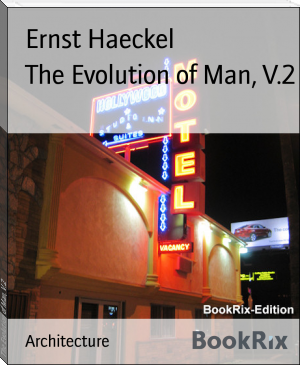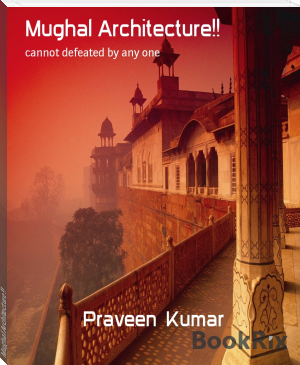The Brethren - H. Rider Haggard (love novels in english .TXT) 📗

- Author: H. Rider Haggard
Book online «The Brethren - H. Rider Haggard (love novels in english .TXT) 📗». Author H. Rider Haggard
On they walked, down the sand-strewn paths for a mile or more, accompanied by Masouda and the guard. At length, passing through a brake of whispering, reed-like plants, of a sudden they came to a low wall, and saw, yawning black and wide at their very feet, that vast cleft which they had crossed before they entered the castle.
"It encircles the inner city, the fortress, and its grounds," said Masouda; "and who lives to-day that could throw a bridge across it? Now come back."
So, following the gulf round, they returned to the castle by another path, and were ushered into an ante-room, where stood a watch of twelve men. Here Masouda left them in the midst of the men, who stared at them with stony eyes. Presently she returned, and beckoned to them to follow her. Walking down a long passage they came to curtains, in front of which were two sentries, who drew these curtains as they approached. Then, side by side, they entered a great hall, long as Stangate Abbey church, and passed through a number of people, all crouched upon the ground. Beyond these the hall narrowed as a chancel does.
Here sat and stood more people, fierce-eyed, turbaned men, who wore great knives in their girdles. These, as they learned afterwards, were called the fedai, the sworn assassins, who lived but to do the command of their lord the great Assassin. At the end of this chancel were more curtains, beyond which was a guarded door. It opened, and on its further side they found themselves in full sunlight on an unwalled terrace, surrounded by the mighty gulf into which it was built out. On the right and left edges of this terrace sat old and bearded men, twelve in number, their heads bowed humbly and their eyes fixed upon the ground. These were the dais or councillors.
At the head of the terrace, under an open and beautifully carved pavilion of wood, stood two gigantic soldiers, having the red dagger blazoned on their white robes. Between them was a black cushion, and on the cushion a black heap. At first, staring out of the bright sunlight at this heap in the shadow, the brethren wondered what it might be. Then they caught sight of the glitter of eyes, and knew that the heap was a man who wore a black turban on his head and a black, bell-shaped robe clasped at the breast with a red jewel. The weight of the man had sunk him down deep into the soft cushion, so that there was nothing of him to be seen save the folds of the bell-shaped cloak, the red jewel, and the head. He looked like a coiled-up snake; the dark and glittering eyes also were those of a snake. Of his features, in the deep shade of the canopy and of the wide black turban, they could see nothing.
The aspect of this figure was so terrible and inhuman that the brethren trembled at the sight of him. They were men and he was a man, but between that huddled, beady-eyed heap and those two tall Western warriors, clad in their gleaming mail and coloured cloaks, helm on brow, buckler on arm, and long sword at side, the contrast was that of death and life.
Chapter Twelve(The Lord of Death)
Masouda ran forward and prostrated herself at full length, but Godwin and Wulf stared at the heap, and the heap stared at them. Then, at some motion of his chin, Masouda arose and said:
"Strangers, you stand in the presence of the Master, Sinan, Lord of Death. Kneel, and do homage to the Master."
But the brethren stiffened their backs and would not kneel. They lifted their hands to their brows in salute, but no more.
Then from between the black turban and the black cloak came a hollow voice, speaking in Arabic, and saying:
"Are these the men who brought me the lion's skin? Well, what seek ye, Franks?" They stood silent.
"Dread lord," said Masouda, "these knights are but now come from England over sea, and do not understand our tongue."
"Set out their story and their request," said Al-je-bal, "that we may judge of them."
"Dread lord," answered Masouda, "as I sent you word, they say that they are the kin of a certain knight who in battle saved the life of him who ruled before you, but is now an inhabitant of Paradise."
"I have heard that there was such a knight," said the voice. "He was named D'Arcy, and he bore the same cognizance on his shield--the sign of a skull."
" Lord, these brethren are also named D'Arcy, and now they come to ask your help against Salah-ed-din."
At that name the heap stirred as a snake stirs when it hears danger, and the head erected itself a little beneath the great turban.
"What help, and why?" asked the voice.
"Lord, Salah-ed-din has stolen a woman of their house who is his niece, and these knights, her brothers, ask you to aid them to recover her."
The beady eyes instantly became interested.
"Report has been made to me of that story," said the voice; "but what sign do these Franks show? He who went before me gave a ring, and with it certain rights in this land, to the knight D'Arcy who befriended him in danger. Where is that sacred ring, with which he parted in his foolishness?"
Masouda translated, and seeing the warning in her eyes and remembering her words, the brethren shook their heads, while Wulf answered:
"Our uncle, the knight Sir Andrew, was cut down by the soldiers of Salah-ed-din, and as he died bade us seek you out. What time had he to tell us of any ring?"
The head sank upon the breast.
"I hoped," said Sinan to Masouda, "that they had the ring, and it was for this reason, woman, that I allowed you to lead these knights hither, after you had reported of them and their quest to me from Beirut. It is not well that there should be two holy Signets in the world, and he who went before me, when he lay dying, charged me to recover his if that were possible. Let them go back to their own land and return to me with the ancient ring, and I will help them."
Masouda translated the last sentence only, and again the brethren shook their heads. This time it was Godwin who spoke.
"Our land is far away, O lord, and where shall we find this long-lost ring? Let not our journey be in vain. O mighty One, give us justice against Salah-ed-din."
"All my years have I sought justice on Salah-ed-din," answered Sinan, "and yet he prevails against me. Now I make you an offer. Go, Franks, and bring me his head, or at least put him to death as I shall show you how, and we will talk again."
When they heard this saying Wulf said to Godwin, in English:
"I think that we had best go; I do not like this company." But Godwin made no answer.
As they stood silent thus, not knowing what to say, a man entered through the door, and, throwing himself on his hands and knees, crawled towards the cushion through the double line of councillors or dais.
"Your report?" said Sinan in Arabic.
"Lord," answered the man, "I acquaint you that your will has been done in the matter of the vessel." Then he went on speaking in a low voice, so rapidly that the brethren could scarcely hear and much less understand him.
Sinan listened, then said:
"Let the fedai enter and make his own report, bringing with him his prisoners."
Now one of the dais, he who sat nearest the canopy, rose and pointing towards the brethren, said.
"Touching these Franks, what is your will?"
The beady eyes, which seemed to search out their souls, fixed themselves upon them and for a long while Sinan considered. They trembled, knowing that he was passing some judgment concerning them in his heart, and that on his next words much might hang--even their lives.
"Let them stay here," he said at length. "I may have questions to ask them."
For a time there was silence. Sinan, Lord of Death, seemed to be lost in thought under the black shade of his canopy; the double line of dais stared at nothingness across the passage way; the giant guards stood still as statues; Masouda watched the brethren from beneath her long eye-lashes, while the brethren watched the sharp edge of the shadow of the canopy on the marble floor They strove to seem unconcerned, but their hearts were beating fast within them who felt that great things were about to happen, though what these might be they knew not.
So intense was the silence, so dreadful seemed that inhuman, snake-like man, so strange his aged, passionless councillors, and the place of council surrounded by a dizzy gulf, that fear took hold of them like the fear of an evil dream. Godwin wondered if Sinan could see the ring upon his breast, and what would happen to him if he did see it; while Wulf longed to shout aloud, to do anything that would break this deathly, sunlit quiet. To them those minutes seemed like hours; indeed, for aught they knew, they might have been hours.
At length there was a stir behind the brethren, and at a word from Masouda they separated, falling apart a pace or two, and stood opposite each other and sideways to Sinan. Standing thus, they saw the curtains drawn. Through them came four men, carrying a stretcher covered with a cloth, beneath which they could see the outline of a form, that lay there stirless. The four men brought the stretcher to the front of the canopy, set it on the ground, prostrated themselves, and retired, walking backwards down the length of the terrace.
Again there was silence, while the brethren wondered whose corpse it was that lay beneath the cloth, for a corpse it must surely be; though neither the Lord of the Mountain nor his dais and guards seemed to concern themselves in the matter. Again the curtains parted, and a procession advanced up the terrace. First came a great man clad in a white robe blazoned with the bleeding dagger, after whom walked a tall woman shrouded in a long veil, who was followed by a thick-set knight clad in Frankish armour and wearing a cape of which the cowl covered his head as though to keep the rays of the sun from beating on his helm. Lastly walked four guards. Up the long place they marched, through the double line of dais, while with a strange stirring in their breasts the brethren watched the shape and movements of the veiled woman who stepped forward rapidly, not seeing them, for she turned her head neither to the right nor left. The leader of the little band reached the space before the canopy, and, prostrating himself by the side of the stretcher, lay still. She who walked behind him stopped also, and, seeing the black heap upon the cushion, shuddered.
"Woman, unveil," commanded





Comments (0)